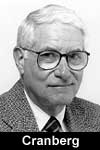Gilbert Cranberg: Des Moines Register Puts Some Zing in Its Candidate Endorsements
Posted at 2:42 pm, November 1st, 2006
This is the time of year when the press opens itself to the charge of playing partisan politics by endorsing candidates for office. The Des Moines Register invited the charge with a vengeance Oct. 29 with a remarkable editorial that began, “If ever there was a time to vote the rascals out, this is it.” The paper called on readers to kick out GOP incumbents and “vote for the Democratic candidates” in four of the five Iowa U.S. House contests. The lone Republican incumbent backed by the paper: Jim Leach, a moderate who often votes with Democrats.
Iowa is split fairly evenly among Democrats, Republicans and independents. And like many papers, the Register is in a battle to hold defecting readers. It was gutsy to risk ticking off a substantial segment of the readership with a hard-hitting editorial that may have little impact other than on circulation.
The paper even reached back to virtually apologize for having twice previously backed a provocative right-wing Republican, Steve King. “This editorial board was wrong in 2002 and 2004,” the Register said in its mea culpa. “There are some people who simply don’t belong in Washington. Steve King is one.”
A lot of papers take the easy way during elections either by not endorsing or by running wishy-washy editorials that give the least offense. Endorsement-time customarily is when publishers come out of the woodwork with advice, which may be why so many endorsements read like a balancing act.
The Register’s was refreshing for its candor. And for laying out clearly why it concluded Republicans must go.
Do newspaper endorsements matter? There’s a perennial debate about it. For some reason, there is little or any concern about how much influence newspapers have on the many other issues they editorialize about daily. My own feeling, based on many years of writing and running endorsements, is that they have marginal, if any, influence. For which I am thankful. It would be terrible for any institution to have so much clout that it could determine the outcome of elections.
Readers can, should and do make up their own minds. Talk about newspaper influence is a distraction from what ought to be the main issue: how effective newspaper election editorials are in stimulating debate about the issues and candidates. Getting readers to think about the choices is what so-called endorsements ought to be about.
Instead, too many publishers worry that, if their papers endorse, readers will think that the papers are slanting news coverage to favor the endorsed candidates. Or that readers will quit taking the paper.
They may well, but many more readers can be lost by a perception that a paper lacks the courage of its convictions. The way to counter a belief that coverage is slanted to conform to editorial positions is to be scrupulously fair and to explain to readers the wall of separation between news and opinion. Catering to ignorance is no way to run a newspaper.
This year’s Register election editorial is a model of passion, reason and courage publishers should want their papers to emulate.





November 2nd, 2006 at 2:04 pm |
[...] Posted in Uncategorized by on November 2, 2006. Grand Forks Herald Instead of making endorsements, the Herald editorial board has posted transcripts of interviews with candidates. “All in all, I think this experiment has been a success, but to me, it just doesn’t replace endorsements,” says editor and publisher Mike Jacobs. > Cranberg: Endorsements have marginal, if any, influence (Nieman) [...]
November 2nd, 2006 at 3:29 pm |
While I would tend to agree generally with your evaluation of the impact of editorials on voters vis a vis national — or even statewide — elections, local and hyper-local papers make a big contribution by endorsing candidates for less high-profile offices (e.g., Town Clerkships, etc.)whose names and accomplishments are unlikely to be familiar to the electorate. Since — the way things seem to be going — such periodicals may be the only survivors of print journalism come the next century, we’ll be relying on them even more to provide such input.